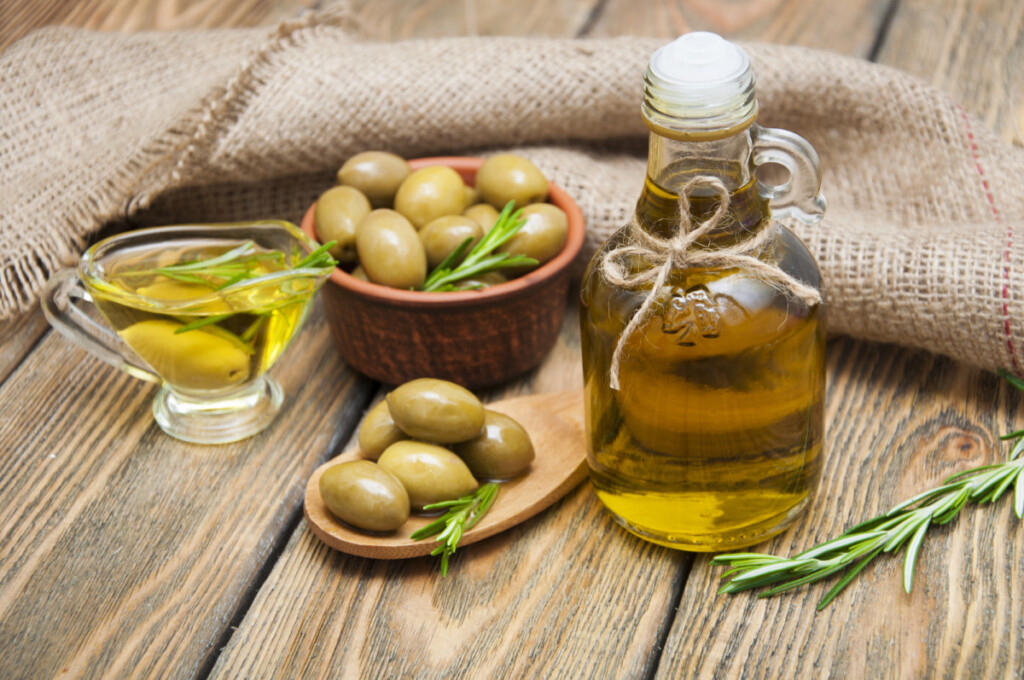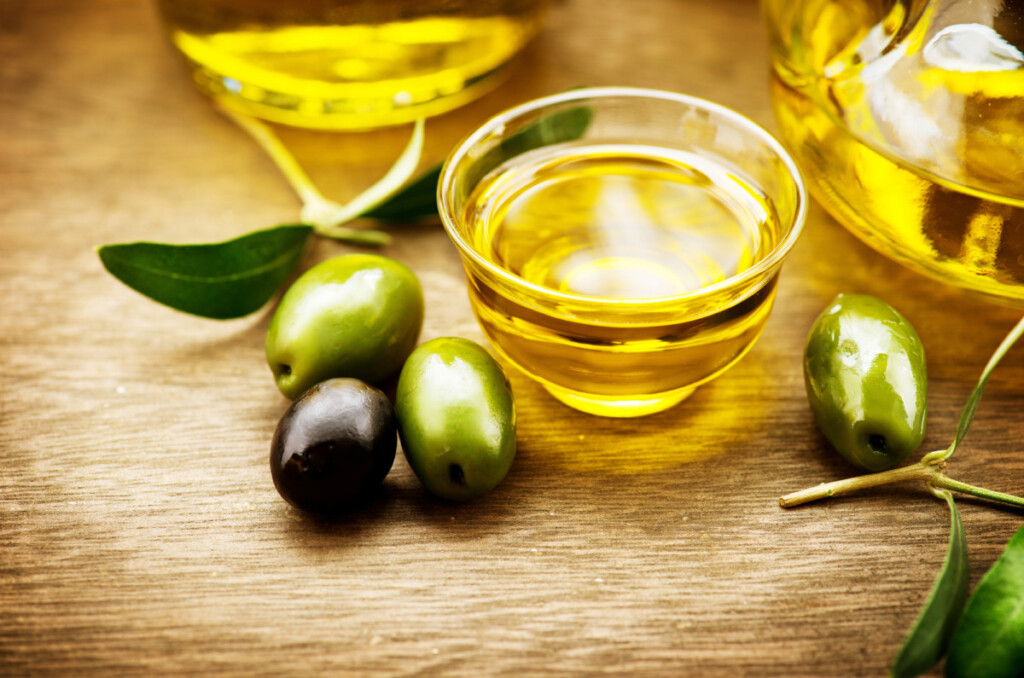Olive oil has some remarkable health benefits to offer. Being a common staple in a majority of homes in the US, you might wonder what benefits it offers other than just being a substitute for vegetable oil. We stumbled upon the same question and decided to provide our readers with some of the most amazing benefits olive oil offers for our wellbeing.
Why is olive oil good for you? Olive oil, especially extra virgin olive oil aids in weight loss, controls your cholesterol levels, keeps your blood sugar in check and prevents many cardiovascular and bone-related conditions.
Did you know that the people in the Mediterranean—the place where olive oil is consumed the most—have the lowest mortality rate due to cardiovascular diseases across the globe? No wonder olive oil was called liquid gold in history (Bo, et al., 2016).
The 13 Miraculous Health Benefits of Olive Oil
From ruling our kitchens, being a popular dressing for salads, to becoming an active ingredient in various beauty creams and hair products, below are some of the most unnoticed healthy benefits of olive oil.

- Makes your nails strong and keeps them from becoming brittle and weak
- Prevents the inception of cerumen impaction –commonly known as earwax
- Serves as a great exfoliator to treat cracked heels
- A cheaper and better alternative to removing makeup
- Is ideal in weight maintenance
- Delays wrinkles and sagging on your face, etc.
But wait, there’s more!
1. Olive Oil Strengthens Your Bones
Skeletal degeneration and the weakening of bones is a common complaint amongst adults and seniors today. Olive oil, with its anti-inflammatory properties, can help with the formation and retention of the mineral density in bones, suggests a study (Chin, 2016). It also suppresses the oxidative stress that our bodies go into as we age, improving our overall health and bone structure. This leads to a better posture and reduced inflammation in the joints after strenuous exercise and with age.
2. Olive Oil Has Anti-Inflammatory Properties
Chronic inflammation is reportedly the leading cause of multiple health conditions such as diabetes, obesity, heart disease, Alzheimer’s and arthritis, etc. With strong anti-inflammatory properties, olive oil can not only delay the onset of these conditions but also eliminate the risk of developing many. Its main anti-inflammatory response is mediated by antioxidants, oleocanthal, being one of the most primary among them. It functions in a similar manner like ibuprofen taken for pain relief and inflammation reduction (Lucas, Russell, & Keast, 2011).
3. Olive Oil Eliminates Kidney Stones
Kidney stones are fairly generic among adult men. It is believed that once they form, there is no stopping them. They will keep coming back to haunt you unless one strictly alters their lifestyle and diet. Kidney stone pain is an intolerable pain that also accounts for multiple visits to the ER. It is only lessened after being injected with a strong painkiller. Kidney stones are formed when salts and minerals like calcium oxalate crystallizes in the form of hard deposits inside the kidney. They may form in the kidneys but often block the urinary tract, causing pain.
Olive oil proves to be beneficial here as it is a thick and dense liquid that can lubricate the tract and help with the passing of stones easily. Its regular use instead of sunflower seed oil can also reduce kidney stone formation over time (Dua, 2001).
4. Olive Oil Aids In Weight Loss
Obesity and weight gain are two of the most common problems these days. Soon enough, it will become one of the most prominent reasons for fatalities due to cardiovascular diseases. But what if we tell you that you don’t have to give up on your favorite fried comfort foods and still be able to lose weight or at least not gain any?
According to a study, published in the Harvard School of Public Health, olive oil plays an effective role in aiding weight loss. During the study, 998 obese or overweight participants were divided into groups and each group followed a different diet. The first group followed the Mediterranean diet, whereas the second group followed a low-fat diet. The findings were shocking. Those who followed a low-fat diet were only able to shed between 6 to 11 pounds after a year, whereas those who followed the Mediterranean diet lost about 9 to 22 pounds in a year. Add to that, those who followed the Mediterranean diet were also at a 30% reduced risk of having a stroke or heart attack (Mediterranean diet beats low-fat diet for long-term weight loss, 2016).
5. Olive Oil Prevents Type 2 Diabetes
Extra virgin olive oil, a variant of olive oil is ideal for keeping your blood sugar levels under control. According to a 2016 study, researchers studied whether the quality of fat had any effect on postprandial blood glucose present in patients with type 1 diabetes. Two different meal forms were compared –high and low-glycemic meals. The effects of the consumption of extra virgin olive oil in high-glycemic meals were shocking. The blood glucose levels were even lower than what was recorded after a low-fat diet or a diet with butter. This means that for patients with diabetes, it can be extremely healthy to include olive oil in their diets to keep their diabetes under control (Bozzetto, et al., 2016)
6. Olive Oil Prevents Cancer
Cancer is the leading cause of death worldwide. According to a study, people in the Mediterranean showed a lower risk of developing it and some researchers believe that it is due to their increased intake of olive oil in their diets (Trichopoulou et al., 2000).
According to them, the antioxidants present in olive oil limit the oxidative damage free radicals cause in the cells and reduce the telomere. Oxidative damage is the prime cause of numerous forms of cancers (Owen, et al., 2004). There have also been some test-tube studies that prove the hypothesis and further go on to suggest that olive oil possesses certain compounds that fight the cancer cells and aid with external chemotherapy and post-recovery. If this is true, its intake should be one of the things we must definitely include in our diets from today onwards.
7. Olive Oil Lowers Your Cholesterol Levels
Here’s a quick fact you must know. There are two types of cholesterol –the good and the bad. The healthy or good cholesterol (HDL) pulls out the bad cholesterol (LDL) which forms plaque in the blood vessels and causes a blockage. This blockage not only limits the amount of oxygen our heart receives but also stops the flow of blood to the heart which results in a limited functioning of other major organs such as the kidneys, liver, lungs and the gallbladder. A little blockage can actually cause you to suffer cardiac arrest and die. Thus for your body to function naturally, it is important that the good wins over the bad. Olive oil does exactly that. It aids the good cholesterol to fight the bad and prevent any blockage and buildup. Researchers believe that regular consumption of olive oil in our routines improves the functioning of the HDL and allows it to eliminate any plaque buildup in the blood vessels (Hernáez, et al., 2017).
8. Olive Oil Prevents Alzheimer’s
Alzheimer’s is the biggest neurodegenerative disease without a cure. An individual with Alzheimer’s is unable to recall memories from their past. If it progresses, they may forget their own name, the name of their children and have zero recall about their past life. It occurs due to the buildup of beta-amyloid plaque which hinders the path of brain cells and causes them to die over time. A study conducted on lab mice indicated that using olive oil can eliminate the beta-amyloid plaque in the brain (Abuznait et al., 2013). Although it is too early to state that it can prevent its onset entirely, some promising studies reveal that it can actually do so!
Just another good reason for you to dress your salads with olive oil or cook your main courses in it.
9. Olive Oil Improves Cardiovascular Health
Fatalities due to heart-related diseases are a common cause of death. As stated above, heart diseases were less common in people in the Mediterranean, as suggested by observational studies. This was one reason why the Mediterranean diet became such a popular diet among the masses as it reduced the chances of one dying from a cardiovascular condition. As we all know, the main component of the Mediterranean diet is olive oil. People who have a history of heart conditions in the family might want to add it to their daily diet right away.
Olive oil lowers the plaque buildup in blood vessels, aids the good cholesterol to fight against the bad, and prevents the clotting of blood in the arteries (Patrick & Uzick, 2001). It has also proven to reduce blood pressure, which is one of the most prevalent signs of heart disease. As per a study, it reduces the need for blood pressure medication by up to 48% (Psaltopoulou, et al., 2004).
10. Olive Oil Relieves Constipation
Constipation is a condition in which passing stool becomes difficult or less frequent than normal. Regular use of olive oil in daily diets can be extremely helpful for allowing the food to pass easily through the colon. Thanks to its texture and consistency, the mobility of the digested food speeds up and passes out with ease (Corona, et al., 2009). Monounsaturated fats are what makes this possible, present abundantly in olive oil.
11. Olive Oil Treats Depression
People who consume diets rich in high trans-fats are at a greater risk of developing depression as compared to those who consume diets rich in monounsaturated and polyunsaturated fats. Sorry to pop your bubble but the majority of fast foods and take-out contain trans-fats that are far from being healthy for your body and heart. But recent studies have shown that your comfort foods can actually add to your levels of stress and make you feel depressed. Luckily, you have the solution right in our pantry. No, it isn’t the ice cream or baked mac-n-cheese, it is olive oil.
Olive oil lowers the risk of depression in individuals despite their diets, eating habits, level of physical activity and lifestyle, as suggested by one ground-breaking research study conducted at the University of Las Palmas de Gran Canaria in Spain (Sánchez-Villegas, et al., 2011).
The study included over 12,000 participants whose dietary choices were monitored. The findings revealed that those who mainly had a Mediterranean diet composed of olive oil were less likely to develop depression. Those who consumed more trans-fat were at a 48% higher risk of becoming depressed compared to those who consumed a monounsaturated fats diet.
12. Olive Oil May Help Prevent Stroke
A stroke occurs when your brain receives a limited supply of blood. It is common amongst seniors and the elderly. Studies reveal that those aged 65 and above can greatly benefit from the use of extra virgin olive oil to reduce the chances of a stroke. Researchers believe that olive oil is a cheaper and more effective means to prevent a stroke. This comes after medical records of approximately 7,625 people in three different cities of France were studied. During follow-up research five years later, it was revealed that 148 of the participants had suffered a stroke.
As per the findings, those who consumed olive oil in their diets were at a 41% lower risk of suffering a stroke compared to those who didn’t consume olive oil. The study was published in Neurology (Samieri et al., 2011).
13. Olive Oil May Reduce Breast Cancer Risk
In 2018 alone, there were two million new cases of breast cancer worldwide with Belgium being on top of the list as per the findings of the Global Cancer Observatory. Shocking, no?
Breast cancer is the second most common type of cancer overall.
During a research study conducted in Barcelona, Spain, it was found that one of the key mechanisms in olive oil can protect against breast cancer in women (Toledo, et al., 2015). The researchers tracked 4,200 women and their dietary habits for a six-year period and the prevalence of breast cancer in them. All the women were asked to follow the Mediterranean diet. Some of the women were told to have an extra helping of nuts and some were advised to have an extra dose of extra virgin olive oil.
The results revealed that women who had an extra dose of extra virgin olive oil were at a 68% lower risk of breast cancer compared to those who consumed more nuts. This was possible due to the presence of monounsaturated fats that olive oil comes packed with.
With all these benefits of olive oil, I wanted to search for some of the best brands online. Here is a list of a few olive oils to try that could be delivered to your doorstep!
- Colavita Extra Virgin Olive Oil, First Cold Pressed, (2 Liters) 68 Fl Oz
- (Pack of 1)Pompeian Robust Extra Virgin Olive Oil – 68 Ounce
- Pompeian (AmazonFresh) Organic Extra Virgin Olive Oil, 24 Oz
- AmazonFresh Organic Extra Virgin Olive Oil, 500 ml (16.9 FL OZ)
- Organic Extra Virgin Olive Oil Sky Organics (16.9 oz) 100% Pure Greek Cold Pressed Unfiltered Non-GMO EVOO- For Cooking Baking – Hair & Skin Moisturizing Award Winning Best USDA Organic Olive Oil

Olive Oil Benefits for the Skin
Wondering if olive oil has any benefits for your skin as well? Luckily, there are numerous benefits. From making your skin healthier inside and out, to serving as a great natural, cheap moisturizer and exfoliator, olive oil extract is a highly demanded ingredient in a majority of beauty creams, serums, and moisturizers. Let’s take a look at these benefits in detail below.
● Olive Oil Improves Skin Health
As more and more people are realizing the wonders of organic and herbal beauty treatments for your skin, it is not a shock that olive oil finds a place on our dressers today as well. We all want a glowing and dewy complexion and it is exactly what olive oil promises. Thanks to its anti-inflammatory and soothing properties, it goes well for all skin types and can be used to keep the skin moisturized and prevent it from drying up. Dehydration of the skin is also one of the complaints which happen due to a lack of sun exposure. Excessive exposure can also dull the overall skin tone and leave it looking blackened and gloomy.
Olive oil is rich in vitamin E, an essential nutrient to keep the skin looking fresh and glowing. Olive oil also helps fight acne, reduce redness and protect it against cancer and psoriasis (Preedy, 2012).
Lastly, since it is lighter in texture and feel than most of the skin creams out there, its application daily doesn’t feel heavy on the skin and certainly doesn’t make it appear oily.
● Olive Oil as an Exfoliator
Exfoliation gets rid of the dead skin which clogs the pores, allows your skin to receive oxygen, and also increases the supply of blood to the skin. Not exfoliating results in dull-looking, tired and dehydrated skin, which, even the best of makeup products can’t hide. Thus, exfoliation is a necessary skincare step. Olive oil mixed with sea salt is a great exfoliator for the skin –all-natural and cheap. Since it doesn’t have any side effects, you may use it every night before going to bed to allow the skin to breathe easily and absorb as much oxygen as required.
● Olive Oil for Reducing Wrinkles
Using olive oil on the skin regularly can prevent wrinkles and fine lines from setting in around the eyes, on the forehead, and under the chin. Wrinkles make one appear older than their age and also makes the application of makeup harder. Developing a habit of dabbing some olive oil area in these areas started above can greatly reduce your chances of wrinkle formation as the skin will remain hydrated and moisturized. Besides, it costs less than all of those drug-store bought anti-aging creams anyways.
● Olive Oil for Reduced Scars
The profusion of vitamin E and anti-inflammatory oxidants also helps with the reduction of scars. It does so by allowing the body to regenerate new cells. It is also great to use with lemon juice to treat areas suffering from hyperpigmentation.
Olive Oil Benefits for the Hair
Did you know that olive oil also has some amazing benefits for your hair? Hair loss is a common issue with men and women. Fortunately, olive oil promotes the growth of new hair as well as strengthen the bonds of your current hair. The presence of vitamin E promotes hair growth and reduces hair loss and split ends.
And there’s more!
Olive oil also smoothens the dry and rough texture of the hair. It reduces frizziness and leaves the hair feeling moisturized, soft and nourished. Heating up the oil for a few seconds and then applying to the scalp strengthens the roots.
Another benefit is the curing of dandruff which becomes a nasty concern during the fall. Dandruff results from the irritation of the scalp as it dries out. It is the flakiness of the scalp that sticks to the hair. With olive oil keeping the scalp smooth and moisturized, you won’t have to worry about dandruff anymore. Regular application will prevent the scalp from becoming irritated and thus avert dandruff.
Selection of Olive Oil
Now that we have listed so many health benefits of olive oil for your body, skin, and hair, you might want to consider buying it on your next visit to the grocery store. When you reach there, you might stumble upon a wide range of brands with different extraction techniques, prices, and uses.
So how do you find the best one?
Below are five considerations you must make before choosing one. Let’s take a look!
- Since this is your first time buying olive oil, you will come across different variants of olive oil such as virgin olive oil, extra virgin olive oil, lampante oil or pure olive oil. If you are looking for extra virgin olive oil, turn the bottle and look for what’s written on the back. It should say it is extra virgin olive oil.
- Next, you need to read the label carefully and look for where it is from originally. If you find more than two countries listed on the label, it means it is traveled a long way and thus might be degraded before reaching the store. You don’t want to buy that.
- Thirdly, you need to find the harvest date. Unlike wine that gets better with age, olive oil is best when prepared fresh. Most good brands list the harvest date on the bottle to let the buyer know when it was prepared and packed. Ideally, olive oil stays good for two years when kept in optimum conditions. If there isn’t a harvest date listed, you might want to put it back on the rack.
- If olive oil smells of wax or peanut butter, it means it is rancid.
- Lastly, if you want to invest in a good quality olive oil, don’t buy something produced elsewhere. Buy domestic as the quality is going to be much better compared with an imported brand.
Is it Suitable for Everyone?
Although olive oil has more benefits than side effects, it is still not suitable for everyone. There are some individuals who must abstain from using olive oil if they have some allergies or conditions, unless they have their doctor’s approval. Some side effects include:
● Allergic Reactions
If you haven’t used olive oil before, there is no way to tell if you are/aren’t allergic to it. If its application on your body or oral consumption makes you experience symptoms similar to that of an allergy, seek attention immediately. If you are allergic to olive oil, your immune system will set off an attack. This will cause your body to produce antibodies. If you apply it to your skin or any other body part such as on your legs, you might experience some itching and rashes if you are allergic to it. Thus, if you plan to apply it topically, it is always best to do a patch test first to ensure you aren’t allergic to it.
● Reaction with Certain Medications
Using olive oil with conditions like diabetes can cause a reaction. It can mess with the effect of medications and cause your blood sugar levels to significantly decline. It can prove to be fatal if one doesn’t seek immediate medical attention.
● Heart Diseases
Anything in excess quantity can be harmful. Although olive oil tends to help multiple heart conditions, consuming it in excess amounts may actually reverse the effects. It is advised that one shouldn’t consume more than 2 tablespoons of olive oil per day.
● Weight Gain
As opposed to common belief, consumption of olive oil in excess can increase the overall fat content in your system, making you gain weight rapidly.
Some Caution to Take With Olive Oil
Lastly, you might be interested in knowing if there are some cautions you must take when using olive oil. Here are the cautions for using olive oil:
- Olive oil has a tendency to burn fast. This means that it shouldn’t be heated for too long as it will start to burn and lose its beneficial properties.
- You mustn’t allow pregnant or lactating women to consume too much olive oil as it can lead to complications.
- Despite contrary beliefs, don’t apply olive oil directly to any cuts, abrasions, burns, or open wounds without consultation.
Related Questions
- How is olive oil made? A basic overview is as follows. Olives are picked, cleaned and washed firstly. They are then pressed into a paste and sent through a centrifuge. The olive paste remnants are pushed to the side, while the water and oil are extracted from the center of the centrifuge. The oil is then further refined and stored in stainless steel containers to prevent breakdown before being shipped.

